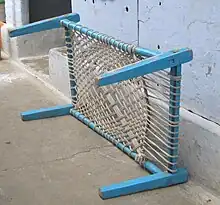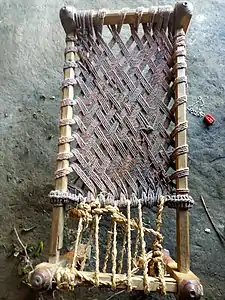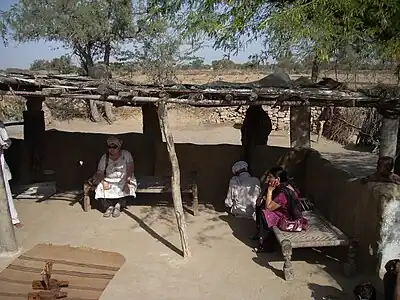

Charpai (also, Charpaya, Charpoy, Khat, Manja, or Manji)[1] is a traditional woven bed used across South Asia. The name charpai is a compound of char “four” and pay “footed”. Regional variations are found in Afghanistan and Pakistan, North and Central India, Bihar and Myanmar.[2]
The charpai is a simple design that is easy to construct. It was traditionally made out of a wooden frame and natural-fiber ropes, but modern charpais may have metal frames and plastic tapes. The frame is four strong vertical posts connected by four horizontal members; the design makes the construction self-leveling. Webbing can be made out of cotton, date leaves, and other natural fibers.
There are many interpretations of the traditional design, and over the years craftspeople have innovated with the weave patterns and materials used. The weaving is done in many ways, e.g. a diagonal cross (bias) weave, with one end woven short, and laced to the endpiece, for tensioning adjustments (which helps in controlling the sagging of the bed as it ages with use).
It is mostly used in warm areas: in cold areas, a similar rope bed would be topped (with an insulating palliasse or tick, stuffed with straw, chaff, or down feathers), and possibly hung with curtains.[3][4][5]
In the 1300s, Ibn Battuta described the charpai as having "four conical legs with four crosspieces of wood on which braids of silk or cotton are woven. When one lies down on it, there is no need for anything to make it pliable, for it is pliable of itself."[6]
Adapted charpais were used as colonial campaign furniture.[7]
Gallery
 A small charpoi in Pakistan, 2019, showing structure.
A small charpoi in Pakistan, 2019, showing structure..jpg.webp) An 800s European Healing at Bethesda scene.
An 800s European Healing at Bethesda scene.
.jpg.webp) Refugees from flooding, 2010
Refugees from flooding, 2010
See also
- Niwar (cotton tape) used for stringing charpais
- Rope bed
- Klinē (Classical Greek)
References
- ↑ Susan Corinne Jamart (1978). Charpai: Indian Cot Filling, a Visual and Technical Documentation. University of California, Berkeley.
- ↑ "The Charpai Project asks you to take a seat for a ringside view of history". 26 December 2018.
- ↑ Karstensen, Rebecca (18 January 2018). Graves, Jean (ed.). "Sleep Tight, Don't Let the Bed Bugs Bite – A Myth Debunked". libraries.indiana.edu.
- ↑ Wright, Bryan. "Colonial Sense: How-To Guides: Interior: Bed Roping". colonialsense.com.
- ↑ "The Stamford Historical Society, A virtual tour through the Hoyt-Barnum House". www.stamfordhistory.org.
- ↑ Battutah, Ibn (2002). The Travels of Ibn Battutah. London: Picador. pp. 185, 317. ISBN 9780330418799.
- ↑ Schwarz, Christopher (3 January 2014). "The Roorkee Bed?". Popular Woodworking Magazine.